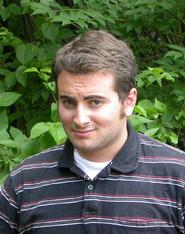
Some people never stop. Michael Mortimer '07 (Montague, N.J.) spent last summer based on campus researching the friendship between Alexander Hamilton and George Washington. This summer, he finds himself several hundred miles south and several hundred years later as, with Peter Cannavo, visiting assistant professor of government, he researches human-induced saltwater intrusions in the Upper Floridian aquifer.
Mortimer describes the situation in South Carolina as "chaotic" and his project as "a challenge." It is certainly complicated. The Upper Floridian aquifer of the title is the one which supplies both Savannah, Ga., and Hilton Head, S.C. Savannah's population has been steadily increasing since 1733; the island of Hilton Head has recently exploded into one of America's most popular vacation resorts. The population growth in both communities has put a higher and higher strain on the aquifer and has, in effect, pumped out too much water. The result of this over-pumping is a reverse vacuum – a cone of depression – which pulls in any water in the surrounding area including the seawater from the sound, and effectively poisons the wells of Savannah and Hilton Head. The problem is shared by both communities, who face agitation from local administrators, their state's respective governments, public health officials and global water authorities. The question which Mortimer proposes to address is, what is being done about it?
In South Carolina for five weeks, Mortimer is examining plans put into place by the two governments. What he finds is that the states have implemented different methods to deal with the problem: Georgia has created an interim plan with their Sound Science Initiative which, though it partially solves the problem for Georgia, does not do much to help South Carolina. Where the condition of the aquifer is a statewide issue in Georgia, it is for South Carolina a community problem and currently only addressed by Hilton Head water officials. They have put in desalination plants, but the problem remains, somewhat exacerbated by Georgia's policy.
But why is a government major researching aquifers? The answer is that Mortimer is also a geosciences minor. He encountered geology his freshman year and loved it enough to make it the subject of his Levitt research despite a lack of background. He says that he is learning technical aspects of hydrogeology as he goes, with the aid of resources loaned by Todd Rayne, professor of geosciences. He found out about the aquifer while doing research for another class: the site had an update about the issue and Mortimer, intrigued, followed the link. He felt that it was an interesting, highly relevant topic; water, he believes, is going to be "a huge issue in the 21st century as water sources get scarce and wells get poisoned." This topic, which appeals both to Mortimer's love of geology and government, offered "great and creative angles for a thesis." Indeed, Mortimer hopes to take this research and use it as a steppingstone for his senior thesis as well.
On campus he is an active member of the TKE fraternity and the geology club, and has participated in the Hamilton Term in Washington program. For the summer though, Mortimer says that the hardest thing about his project is getting people to talk to him. "I'm playing a lot of phone tag," he says ruefully, but it is clear that this "conflict between environment and governmental policies" is deeply interesting to him.
The grant which funds his work is the Levitt Research Fellowship, funded by the Arthur Levitt Public Affairs Center. This grant is intended to fund research in a public affairs issue and allows a student to spend 10 weeks working closely with a faculty advisor.
-Lisbeth Redfield
Posted June 20, 2006
